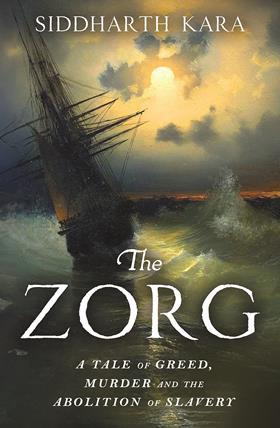The Zorg: A Tale of Greed, Murder and the Abolition of Slavery
Siddharth Kara
£22, Doubleday
★★✩✩✩
JMW Turner vented his anger on to canvas: his 1840 work Slave Ship: Slavers throwing overboard the dead and the dying, typhoon coming on, retains its power to shock. Historian of modern slavery Siddharth Kara achieves something similar with his account of a ‘culminating act of inhumanity’ in the Atlantic slave trade.
In what most Gazette readers will know as the Zong case, more than 100 African captives were thrown overboard from a mishandled ship – a loss claimed on the underwriters as if it were sacks of coal. The allegation, of course, was that the captives’ insured value was worth more than their emaciated live bodies would have made at auction in Jamaica.
Kara’s account of the voyage, the subsequent judicial proceedings and the episode’s importance for the campaign against slavery, is much more than massacre porn. For a start, he does a historical service by clearing up the name of the cursed ship: the ‘Zong’ was the seized Dutch slaver De Zorg (The Hope). The confusion may have been a misreading by Lord Chief Justice Mansfield, a man with whom it was generally prudent to agree.

Kara also confers on two of the otherwise anonymous victims the dignity of human names. And, a plausible epilogue offers a solution to a mystery about the massacre, the author of an anonymous letter to the Morning Chronicle in 1783 which began the ‘inexorable march to freedom’ (at least in parts of the world commanded by Royal Navy guns).
The Zorg is billed as correcting previous accounts ‘filled with inaccuracies’. Alas, Kara’s quest for a compelling narrative introduces a few of his own. While he does a fair job of explaining Zorg’s navigational woes, he does not appear to be a mariner himself. We have sails fastened by shrouds, a crew waiting for nightfall before setting watches and captains taking the ship’s wheel. UK lawyers, meanwhile, will blink at Lord Mansfield’s enthusiastic gavel-wielding.
Another oddity is Kara’s assertion that France’s 1793 declaration of war on England was due to ‘the meteoric rise’ of Napoleon Bonaparte – at the time an unknown captain of artillery.
Do such trivialities matter? Kara’s underlying message, that institutions recognisable in modern Britain were complicit in the Atlantic slave trade, will no doubt be seized upon in the burgeoning campaign for reparations. Facts will be important.
Michael Cross is news editor at the Law Society Gazette































No comments yet